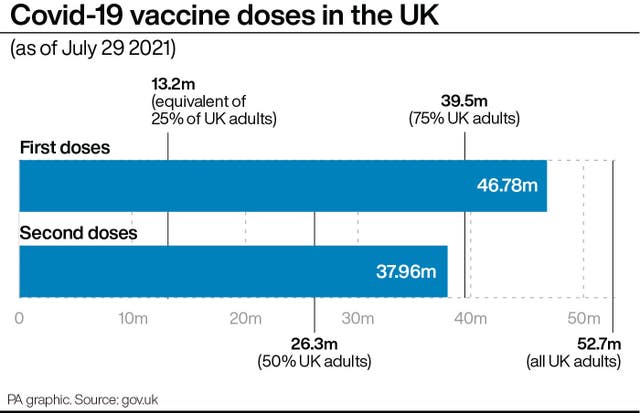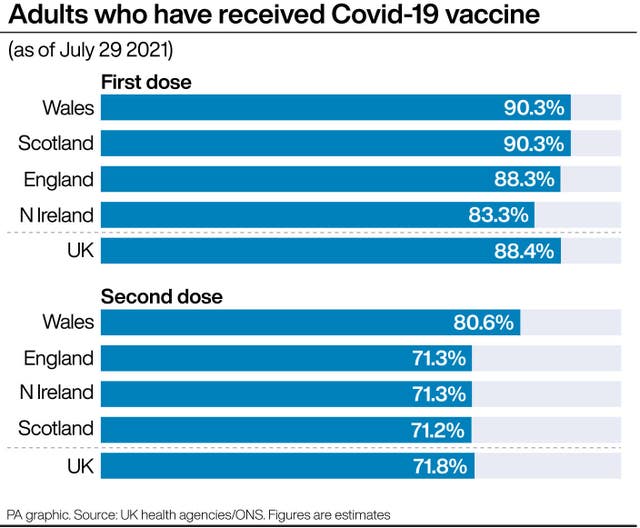Any increase in foreign travel this summer is concerning while autumn could prove to be “a particularly risky point” for the country, scientists advising the Government on coronavirus have warned.
It came as the latest figures showed the level of coronavirus infection has risen in three of the four nations while new reported cases have fallen slightly.
The latest estimates suggest Covid infections in households reached their highest level in England and Northern Ireland since the end of January.
The only part of the UK to see a fall was Scotland, according to the Office for National Statistics in its snapshot of the level of infection for the week to July 24.
Meanwhile, daily reported cases of the virus decreased slightly to 29,622, according to Government figures on Friday.
Newly-published documents, revealing expert advice given to ministers earlier this month, raised concerns that the return of students to schools and universities for the new term could place “significant pressures” on the health service.
Foreign Secretary Dominic Raab this week insisted the Government’s new rules on travel allowing fully vaccinated people from the US and EU to enter the country without having to quarantine are part of a “modest opening up”.
A document dated July 14 stated the importance of global surveillance on the emergence of new variants and added: “Any increase in foreign travel over the summer and the return of international students to universities in the autumn is of particular concern.”

In the same document from the Scientific Pandemic Influenza Group on Modelling, Operational sub-group (SPI-M-O), experts warned that September and October “will be a particularly risky point in the trajectory of the epidemic”.
It states that “significant pressures on healthcare could be seen” if more normal behaviours, following the lifting of many restrictions, coincide with the return of schools and universities.
The warnings were published a day after England’s deputy chief medical officer, Professor Jonathan Van-Tam, said he hopes the worst of the pandemic is behind us but warned there could be “one or two bumpy periods” ahead.
He said respiratory viruses like flu could come back this winter, having been suppressed in last winter’s lockdown.
Scientists have also stated that, with immunity from Covid-19 vaccines likely to wane over time, jab rollouts will be likely “for many years to come”.

Transport Secretary Grant Shapps hailed the idea of workers being double-jabbed before returning to the office but said it will not be made a legal requirement.
He also confirmed that while revellers will need proof of vaccination for entry to nightclubs later this year, it will not be needed to go to the pub.
Asked about people having both vaccine doses before they go back to the office, Mr Shapps told Sky News: “It is a good idea and, yes, some companies will require it.
“We are not going to make that legislation that every adult has to be double-vaccinated before they go back to the office but, yes, it is a good idea and, yes, some companies will require it.”
Labour leader Sir Keir Starmer said while he can “see a case for vaccine passports”, he did not agree with a “jabs for jobs” approach.
He told broadcasters: “For day-to-day routine – access to the office, access to health services or dentistry or even food – I don’t agree with vaccine passports for day-to-day access.”
Mr Shapps also indicated the Government is unlikely to budge on the August 16 date for people in England who are double-vaccinated no longer having to self-isolate if a contact tests positive for coronavirus, despite pressure as other nations move to drop the rule earlier.
Wales has confirmed fully vaccinated adults will not have to isolate from August 7, a change which will come into effect on the same day the nation is expected to move to alert level zero – when most coronavirus restrictions will be lifted.
Scotland is also expected to remove the need for fully vaccinated people to isolate on August 9, while Northern Ireland will review its rules on the matter on August 12.




Comments: Our rules
We want our comments to be a lively and valuable part of our community - a place where readers can debate and engage with the most important local issues. The ability to comment on our stories is a privilege, not a right, however, and that privilege may be withdrawn if it is abused or misused.
Please report any comments that break our rules.
Read the rules here